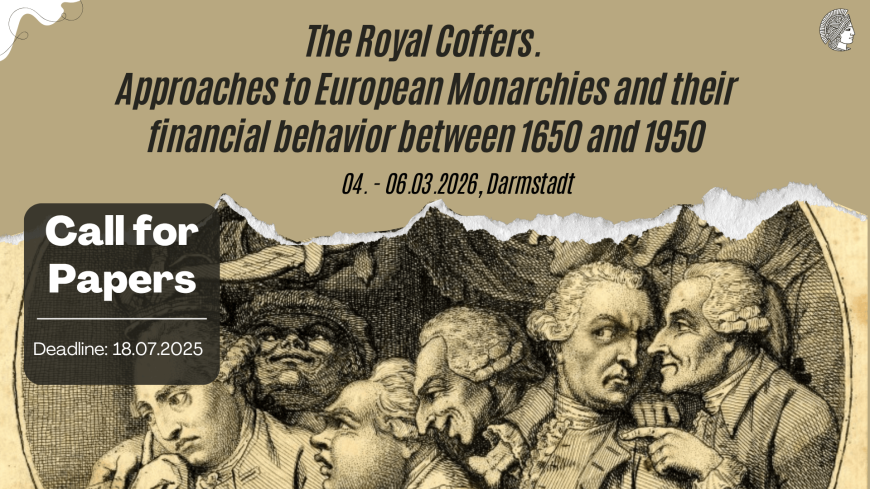The Royal Coffers. Approaches to European Monarchies and their financial behavior between 1650 and 1950
Call for Papers, International Conference, 04.-06.03.2026 / Darmstadt
2025/07/04 von Giuseppina Amenta
Deadline: 18th July 2025

“Royalty, after all, is an expensive government.” These words, written by John Wade in his famous Black Book in the 1820s, mirror a sentiment that has been debated time and time again and remains relevant to this day. Indeed, money plays a central role in monarchies and it is a fundamental component of government. It enables armies and wars to be financed, provides a basis for diplomatic negotiations and administration, and finances the royal court and royal lifestyle. Additionally, money was used to sustain royal patronage and what was called 'corruption', depending on where and when one asked.
In recent years, the keywords “monarchy” and “money” have attracted increasing interest from historians, resulting in conferences and publications that bring together the history of monarchy and economic history. As part of the ‘Monarchy and corruption debates in the long 19th century’ project led by Prof. Jens Ivo Engels and conducted by Sarah Deck and Markus Horbach from the History Department at Technische Universität Darmstadt, we want to build on this work and introduce new aspects.
Important questions are: Where do the private and public funds of monarchies come from, how are they used, and how are these financial practices perceived? We seek to examine not only the role of the monarch himself, but also their spouse, children, other members of the royal family, as well as leading personalities of the royal court or government. We are not only interested in ruling dynasties, but also the dethroned (e.g. in Germany and Central Europe after 1918, or in France after 1830, 1848 and 1870). We are interested in the financial interactions and networks of and between all these actors. An important aspect will be the connection of financial practices and public debates: For example, how practices of acquiring and using monarchical wealth that were previously seen as appropriate could later become denounced as illegitimate or corrupt.
Covering the period from the end of the Thirty Years' War to the end of the Second World War, i.e., approximately 1650 to 1950, there is a strong link to the question of how monarchy has modernized since the end of the early modern period.
We welcome contributions that deal with the following topics, among others: (capital) investments, and speculation by monarchies; financial networks between the abovementioned actors; the venality of and by monarchies; patronage, micro-politics and corruption; the scope of action of female actors; the relationships between monarchs and leading industrialists and bankers; changing public perceptions/scandals/debates.
The conference will take place from 4th – 6th of March 2026 in Darmstadt. Presentations should be 15 minutes long, and will be followed by a discussion. The workshop will be held in English. Please send us your proposal, detailing your name and affiliation, the title of your talk and an abstract not longer than 550 words.
Paper givers’ travel and accommodation costs will be covered by the conveners.
The deadline for applications is 18th of July 2025.
Please send the abstract to: workshop-royal-coffers@pg.tu-…
Conveners:
Jens Ivo Engels / Sarah Deck / Markus Horbach
Modern and Contemporary History, TU Darmstadt, Germany
workshop-royal-coffers@pg.tu-…
